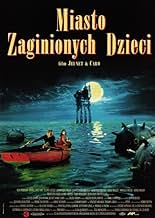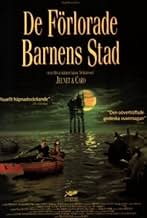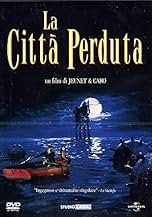Un científico en una sociedad surrealista secuestra niños para robarles sus sueños, esperando que esto retrase su envejecimiento.Un científico en una sociedad surrealista secuestra niños para robarles sus sueños, esperando que esto retrase su envejecimiento.Un científico en una sociedad surrealista secuestra niños para robarles sus sueños, esperando que esto retrase su envejecimiento.
- Dirección
- Guionistas
- Elenco
- Premios
- 5 premios ganados y 14 nominaciones en total
Geneviève Brunet
- La Pieuvre
- (as Genevieve Brunet)
Mapi Galán
- Lune
- (as Mapi Galan)
Briac Barthélémy
- Bottle
- (as Briac Barthelemy)
Léo Rubion
- Jeannot
- (as Leo Rubion)
Opiniones destacadas
How can you not love this movie? From the amazingly talented team of Marc Caro and Jean-Pierre Jeunet comes this superbly original fantasy tale, that just oozes inventiveness and drags you into it's world, where it's all too easy to completely lose yourself. Caro and Jeunet were, of course, the good people behind the brilliant 'Delicatessen'. The City of Lost Children is kind of like Delicatessen mark 2. The style is still there in droves, except in this film it's much more abundant, and while Delicatessen had a base in reality, The City of Lost Children can easily be classified simply as 'pure' fantasy. The film is very French, and even if you didn't know where it's makers came from, you'd be able to guess. The French style is great anyway, and an excellent base to make a movie from, but when it's mixed with Jeunet's personal style, we've got a movie on our hands! That's exactly what this film is too; pure cinema. This is the sort of experience that I watch movies for, and so the film gets a huge thumbs up on that front.
The plot follows a man named Krank. Krank ages prematurely because he cannot dream, thus leading him to kidnap the local children and attempt to steal their dreams. However, as Krank is many a child's worst nightmare, that's exactly what he gets; nightmares, which just isn't good enough. The fun starts when Krank's men kidnap the brother of strongman Ron Perlman, who then sets out with a young orphan girl to find him. The two leads; Ron Perlman and Judith Vittet do a magnificent job of carrying the film, and their very different appearances and persona's blend well with one another. Judith Vittet really does steal the show all on her own, however, as her performance is far more mature than you would expect from an actress so young. It's a shame she only has four film credits to her name. It's not the actors that are the real stars of this film however, as the surrealistic style just steals every scene. You spend most of the movie simply admiring the lavish settings and absolutely sublime uses of CGI.
As mentioned, this is exactly the sort of production that cinema was invented for. The inventiveness on display is simply stunning and puts just about every other film in it's class to shame. Jean-Pierre Jeunet is one of today's finest filmmakers, and along with a select group of individuals is one of the few directors left that are still capable of a masterpiece. And that's exactly what this film is; a masterpiece.
The plot follows a man named Krank. Krank ages prematurely because he cannot dream, thus leading him to kidnap the local children and attempt to steal their dreams. However, as Krank is many a child's worst nightmare, that's exactly what he gets; nightmares, which just isn't good enough. The fun starts when Krank's men kidnap the brother of strongman Ron Perlman, who then sets out with a young orphan girl to find him. The two leads; Ron Perlman and Judith Vittet do a magnificent job of carrying the film, and their very different appearances and persona's blend well with one another. Judith Vittet really does steal the show all on her own, however, as her performance is far more mature than you would expect from an actress so young. It's a shame she only has four film credits to her name. It's not the actors that are the real stars of this film however, as the surrealistic style just steals every scene. You spend most of the movie simply admiring the lavish settings and absolutely sublime uses of CGI.
As mentioned, this is exactly the sort of production that cinema was invented for. The inventiveness on display is simply stunning and puts just about every other film in it's class to shame. Jean-Pierre Jeunet is one of today's finest filmmakers, and along with a select group of individuals is one of the few directors left that are still capable of a masterpiece. And that's exactly what this film is; a masterpiece.
The evil Krank (Daniel Emilfork), his dwarf wife and his clone minions children (Dominique Pinon) have a machine to steal the dreams of young children because Krank can't have dreams himself. One (Ron Perlman) is a strong man performer whose little brother Denree is kidnapped by Krank's underlings, the Cyclops. Miette (Judith Vittet) is a young street kid who ends up helping him.
This has a lot of weird concepts on display. I can only describe this a outlandish mix of Dickensian poverty and a french grimy Jules Verne sci-fi with a good helping of weird surrealism. The visual is a good unique grim fairy tale but the story drags a little too much. It meanders and is confused. It is in love with its visual surrealism more than trying to make sense with the story. It should be a lot more simpler than what it is. It spends a lot of time luxuriating in the weirdness of the world and the villain.
This has a lot of weird concepts on display. I can only describe this a outlandish mix of Dickensian poverty and a french grimy Jules Verne sci-fi with a good helping of weird surrealism. The visual is a good unique grim fairy tale but the story drags a little too much. It meanders and is confused. It is in love with its visual surrealism more than trying to make sense with the story. It should be a lot more simpler than what it is. It spends a lot of time luxuriating in the weirdness of the world and the villain.
The first time I saw this movie I shook my head and wondered why I wasted three dollars renting this movie. It seemed to me that the storyline was worthless. However, I gave this movie a second chance, and this time instead of constantly reading the subtitles I paid more attention to the acting and events taking place on-screen.
I was shocked. The amount of creativity and symbolism blew me away. A lot of questions I had accumulated throughout my first viewing were answered by watching the movie carefully.
I recommend to everyone who thought this a poor movie to watch it again. If you don't speak French (like myself) try not to get so involved in the subtitles that you miss critical detail. It's there, and it's important, trust me!
I was shocked. The amount of creativity and symbolism blew me away. A lot of questions I had accumulated throughout my first viewing were answered by watching the movie carefully.
I recommend to everyone who thought this a poor movie to watch it again. If you don't speak French (like myself) try not to get so involved in the subtitles that you miss critical detail. It's there, and it's important, trust me!
10presence
The City of Lost Children is my all time favorite movie. It is unlike anything I've ever seen or experienced before. It's a movie that I hold dear to my heart and will never forget. I have to be honest though, the first time I saw this movie, I really didn't like it at all. The story was too confusing, and the characters were extremely weird and twisted. After watching it a second and third time, however, I understood what was going on more, and could spend more time looking at the visuals rather than the subtitles. Speaking of visuals, this movie has it in spades. The environment that Jean-Pierre Jeunet created is out of this world. The city is very dark and the water looks as if there are secrets hidden within. The mood the soundtrack sets is perfect for the scenery and the superb acting by everybody (including the kids) just adds to the greatness of this flick. I highly recommend this movie, it's one of those movies that you will never forget watching, and the images will stay in your head for a very long time. A beautiful, beautiful, movie. 10/10
I can't help myself: I adore this film. I freely accept that it's not going to be everyone's cup of tea; if pushed, I might even accept that it's not perfect. But there's no film I love more, or more enjoy re-watching. One caveat though: I've seen both the subtitled and the dubbed print, and the English dubbing frankly comes close to ruining the movie. Ron Perlman dubs himself and is fine, and some of the other adult English actors are perfectly OK, though they tend to be blander than the French originals. But most of the children are terrible, and with her own voice it's Judith Vittet's extraordinary performance (all the more extraordinary considering she was nine at the time) that helps give "La Cité" the genuine emotional centre that some viewers don't feel it has.
But I'll come back to that. In any version, at least Jeunet and Caro's astonishing visual flair and artistry come over. I can't think of a film that has such a concentration of memorable shots - time and again, especially watching on DVD with a freeze-frame facility, you realize how many beautiful compositions Jean-Pierre Jeunet gives us: though the cast of characters could easily fill a freak show, and the sets are dark and quite unglamorous in themselves, the cinematography is gorgeous and the mise-en-scène often strangely elegant. It has a look all of its own, perfect for a modern, urban fairy-tale. The music too is gorgeous, one of the finest scores by David Lynch's regular musical collaborator, Angelo Badalamenti.
"Fairy tale" is I think the best generic starting-point for this film, so long as you think Grimm rather than Disney. (Unlike "Delicatessen", it isn't really a comedy, though it has comic elements). And the plot works according to its own logic, even if the progression from scene to scene is occasionally a bit lumpy or obscure. Krank (the astonishing Daniel Emilfork), grown prematurely old because he cannot dream, uses a cult of blind, messianic preachers to abduct children from a decaying industrial port and steal their dreams - but they have only nightmares, and Krank falls ever deeper into despair and evil. It's up to the orphan pickpocket Miette and a none-too-brainy circus strongman, One, to put a stop to him. This rich idea is elaborated with all sorts of visual conceits and eccentric characters - Jeunet mounts, for example, a couple of astonishing sequences in which chains of unlikely effects proceed from the smallest of causes - but never at the expense of the central relationship of One and Miette.
In a sense Miette, like Krank, has grown old too fast: the orphaned street-children of this city are savvy and unsentimental, and never seem to have had a childhood; meanwhile there's something deeply childish, in various ways, about most of the adults. Sensitively directed and never overacting, Judith Vittet's Miette gradually thaws, and Ron Perlman brings a lot of sympathy and pathos to what could have been an oafish, cartoonish role: Jeunet gives plenty of space and subtlety to their gradually-developing friendship, and dares to do what I suspect no English director would dare to do at the moment, which is to make their relationship innocently sexualized. Neither of them is really a grown-up, but it's still an extremely risky move, exploring the first stirrings of pre-pubescent sexuality while trying not to be exploitative or prurient. I do think the film pulls it off, though I can imagine some viewers feeling distinctly uncomfortable with it. For me it's one of the most convincingly unsentimental and nuanced (if mannered) portrayals of childhood I've ever seen on the screen, and there is real compassion and tenderness along the way, as well as some darker twists and turns.
It's a film that rewards analysis if you're prepared to surrender to its strange world with its strange rules. But it rewards the senses and the emotions too - and it radiates love of cinema as the perfect medium for sophisticated fantasy. One elderly actress who appears towards the end (Nane Germon) acted - as Jeunet's DVD commentary points out - in Jean Cocteau's "La Belle et la Bête" about fifty years earlier (there are, by the way, distinct references to the Beauty and the Beast story here), and "La Cité des enfants perdus" deserves to join that film as one of the classic cinematic fairy-tales. Pity about Marianne Faithfull over the closing credits, though!
But I'll come back to that. In any version, at least Jeunet and Caro's astonishing visual flair and artistry come over. I can't think of a film that has such a concentration of memorable shots - time and again, especially watching on DVD with a freeze-frame facility, you realize how many beautiful compositions Jean-Pierre Jeunet gives us: though the cast of characters could easily fill a freak show, and the sets are dark and quite unglamorous in themselves, the cinematography is gorgeous and the mise-en-scène often strangely elegant. It has a look all of its own, perfect for a modern, urban fairy-tale. The music too is gorgeous, one of the finest scores by David Lynch's regular musical collaborator, Angelo Badalamenti.
"Fairy tale" is I think the best generic starting-point for this film, so long as you think Grimm rather than Disney. (Unlike "Delicatessen", it isn't really a comedy, though it has comic elements). And the plot works according to its own logic, even if the progression from scene to scene is occasionally a bit lumpy or obscure. Krank (the astonishing Daniel Emilfork), grown prematurely old because he cannot dream, uses a cult of blind, messianic preachers to abduct children from a decaying industrial port and steal their dreams - but they have only nightmares, and Krank falls ever deeper into despair and evil. It's up to the orphan pickpocket Miette and a none-too-brainy circus strongman, One, to put a stop to him. This rich idea is elaborated with all sorts of visual conceits and eccentric characters - Jeunet mounts, for example, a couple of astonishing sequences in which chains of unlikely effects proceed from the smallest of causes - but never at the expense of the central relationship of One and Miette.
In a sense Miette, like Krank, has grown old too fast: the orphaned street-children of this city are savvy and unsentimental, and never seem to have had a childhood; meanwhile there's something deeply childish, in various ways, about most of the adults. Sensitively directed and never overacting, Judith Vittet's Miette gradually thaws, and Ron Perlman brings a lot of sympathy and pathos to what could have been an oafish, cartoonish role: Jeunet gives plenty of space and subtlety to their gradually-developing friendship, and dares to do what I suspect no English director would dare to do at the moment, which is to make their relationship innocently sexualized. Neither of them is really a grown-up, but it's still an extremely risky move, exploring the first stirrings of pre-pubescent sexuality while trying not to be exploitative or prurient. I do think the film pulls it off, though I can imagine some viewers feeling distinctly uncomfortable with it. For me it's one of the most convincingly unsentimental and nuanced (if mannered) portrayals of childhood I've ever seen on the screen, and there is real compassion and tenderness along the way, as well as some darker twists and turns.
It's a film that rewards analysis if you're prepared to surrender to its strange world with its strange rules. But it rewards the senses and the emotions too - and it radiates love of cinema as the perfect medium for sophisticated fantasy. One elderly actress who appears towards the end (Nane Germon) acted - as Jeunet's DVD commentary points out - in Jean Cocteau's "La Belle et la Bête" about fifty years earlier (there are, by the way, distinct references to the Beauty and the Beast story here), and "La Cité des enfants perdus" deserves to join that film as one of the classic cinematic fairy-tales. Pity about Marianne Faithfull over the closing credits, though!
¿Sabías que…?
- TriviaTo achieve the slightly skewed color scheme of the movie, the actors were made up in white face and the color palette corrected until they were flesh-toned.
- ErroresThe words from The Original that Miette remembers in flashback (after she receives Uncle Irvin's dream message) differ slightly from what The Original actually said, although the point of the message is still the same.
- Citas
[after Mlle. Bismuth has been harpooned]
Clone: Does it hurt?
Mlle. Bismuth: Yes, I'm allergic to steel.
- Versiones alternativasThere are two different audio tracks for the film - one is the original French language version and another is an English language dub.
- ConexionesFeatured in Les enfants de la cité perdue (1995)
- Bandas sonorasWho Will Take Your Dreams Away
Music by Angelo Badalamenti
Lyrics by Marianne Faithfull
Performed by Marianne Faithfull
Selecciones populares
Inicia sesión para calificar y agrega a la lista de videos para obtener recomendaciones personalizadas
Detalles
- Fecha de lanzamiento
- Países de origen
- Sitios oficiales
- Idiomas
- También se conoce como
- The City of Lost Children
- Locaciones de filmación
- Productoras
- Ver más créditos de la compañía en IMDbPro
Taquilla
- Presupuesto
- USD 18,000,000 (estimado)
- Total en EE. UU. y Canadá
- USD 1,738,611
- Fin de semana de estreno en EE. UU. y Canadá
- USD 34,348
- 17 dic 1995
- Total a nivel mundial
- USD 1,784,338
Contribuir a esta página
Sugiere una edición o agrega el contenido que falta



























